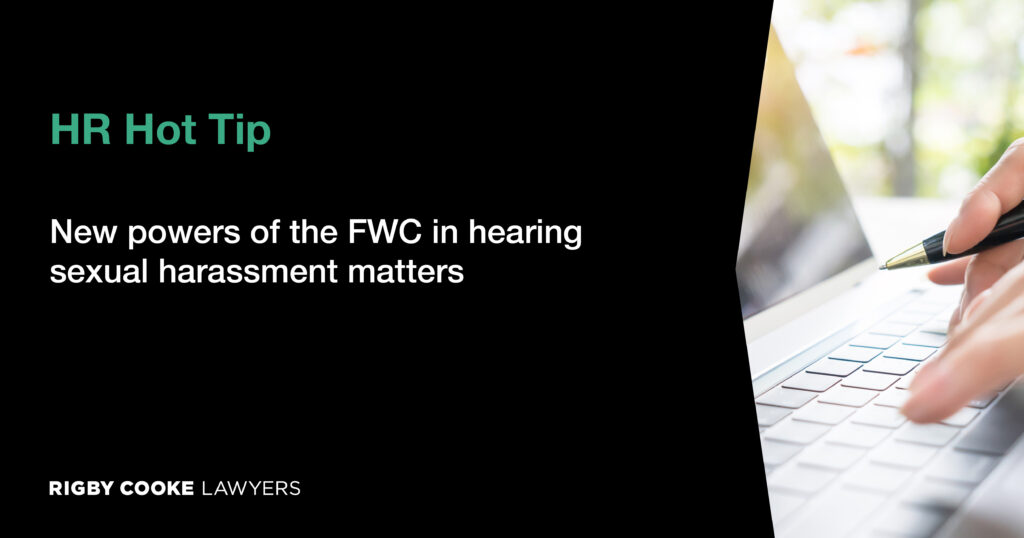Welcome to our series of HR interviews with Workplace Relations Associate Stephanie Shahine, who answers some of the most commonly asked questions by HR managers regarding employees’ legal entitlements and employers’ health and safety requirements.

From 11 November 2021, the Fair Work Commission (FWC) has jurisdiction to make orders to stop sexual harassment at work. These orders can be made in conjunction with stop bullying orders at work.
The recent Sex Discrimination and Fair Work (Respect at Work) Amendment Act 2021 (2021 Act) has amended the Fair Work Act 2009 (Cth) (FW Act) at Part 6-4B to allow the FWC to make an order for workers who are bullied or sexually harassed at work. The FW Act refers to the definition of sexual harassment under the Sex Discrimination Act 1984 (SDA) to define this conduct.
Sexual harassment as per section 28A of the SDA is defined as:
-
-
An unwelcome sexual advance, or an unwelcome request for sexual favours, to the person harassed; or
-
If a person engages in other unwelcome conduct of a sexual nature in relation to the person harassed
-
In circumstances in which a reasonable person, having regard to all the circumstances, would have anticipated the possibility that the person harassed would be offended, humiliated, or intimidated.
The FWC can make an order to prevent a worker from being sexually harassed and/or bullied at work if it is satisfied that the conduct has occurred at work by one or more individuals and that there is a risk that this will continue.
The order can be in the form of any order that the FWC considers appropriate (other than requiring financial payment), which would protect the worker from the ongoing conduct. Whilst these changes have come into effect from 11 November 2021, a person may still make an application to the FWC for conduct which may have occurred prior to this date. The FWC, however, will only be able to make an order if there is an ongoing risk that the person may continue to be sexually harassed.
Some examples of orders which the FWC can make include:
- changes in working arrangements
- one or more individuals to stop specified behaviour
- regular monitoring of behaviours by an employer
- compliance with an employer’s policy
- the provision of information and additional support and training to workers
- conduct a safety risk assessment for the workplace, and
- a review of the employer’s workplace policies
In addition to the above, the definition of conduct which could justify dismissal under the FW Act has also been amended to adopt the amendments arising from the 2021 Act. Specifically, section 387 of the FW Act now states that a valid reason for the dismissal of a person includes whether that person has sexually harassed another person and if that person has done so in connection with their employment.
Employers need to familiarise themselves with and understand their legal obligations under the changes to the Sex Discrimination and Fair Work (Respect at Work) Amendment Act 2021 and the Fair Work Act 2009.
Under the accessorial liability provisions of the Fair Work Act 2009, employers and individuals such as directors and HR managers can be personally held accountable for breaching workplace laws in certain circumstances.
A HR Legal Audit conducted by Rigby Cooke’s Workplace Relations team can provide the HR function and, in turn, provide employers with comfort in knowing that they are legally compliant, or at least provide advance warning of any potential compliancy issues before they become problematic.
| Disclaimer: This publication contains comments of a general nature only and is provided as an information service. It is not intended to be relied upon as, nor is it a substitute for specific professional advice. No responsibility can be accepted by Rigby Cooke Lawyers or the authors for loss occasioned to any person doing anything as a result of any material in this publication.
Liability limited by a scheme approved under Professional Standards Legislation. ©2021 Rigby Cooke Lawyers |
